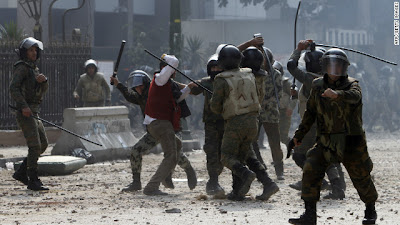-
Saturday, December 17, 2011
Egyptian military again clash with protesters, 8 dead, hundreds wounded
While others throw stones from the roof of the Parliament building, a soldier pisses on the protesters. Literally. (Photo Mostafa Sheshtawi)
Updated Saturday: The Egyptian Health ministry on Saturday morning reported that eight people died and 300 were injured Friday during the clashes between the military and the people that manned the sit-in in front of the government offices at Qasr al-Einy Street in Cairo. Among the dead were a member of the 6 April Youth Movement, Ahmed Mansour, and Sheik Emad Effat, a cleric of Al-Azhar. Both had been shot.
The fight between troops and demonstrators was the worst violence since Egypt began its elections. They broke out on Thursday night and seems to have been triggered by the fact that the people of the sit in
were playing a game of football and a ball went through a window inside the building of the Parliament. One of the players went inside the building to retrieve the ball and was reportedly beaten. After that a fight broke out during which military police burned the tents of the protesters and pelted them with stones, broken china and trash from the rooftop of the Parliament building. Later on some thousands took part in a protest march in a nearby street. The crowd was met with teargas, rubber bullets and live ammunition. By early afternoon, ambulance sirens were wailing as troops tried to disperse around 10,000 protesters with truncheons and what witnesses said appeared to be electric cattle prods.
Clashes raged on after nightfall. On Saturday a new round of fighting started with troops and protesters pelting each other with stones. The army had sealed off the area around the government buildings in the meantime and driven the protesters back in the direction of Tahrir Square .
Th sit-in was a left-over from the protests against the appointment of Kamal al-Ganzoury, a former Prime Minister from the Mubarak-era, at the head of a new government. The protesters from then on blocked his ministerial office.
The ruling military council, in a statement read on state television, denied troops had tried to disperse the sit-in. It also denied troops had used fire-arms and said the violence started when one of the officers maintaining security outside parliament was attacked while on duty. The public prosecutor would investigate that incident, the council said.
According to the protesters these were all plain lies. And a new civilian advisory council that was set up to offer guidance to the army generals on policy said it would resign if its recommendations on how to solve the crisis were not heeded. Presidential candidate Amr Moussa, who is a member of the civilian council, told an Egyptian satellite television station, the council had suspended its meetings until the military council meets its demands that include an end to all violence against demonstrators.
Reports of beatings of well-known pro-democracy activists buzzed across social media and politicians from Islamists to liberals lined up to condemn the army's tactics.
"Even if the sit-in was not legal, should it be dispersed with such brutality and barbarity?" asked Mohamed ElBaradei, a presidential candidate and former U.N. nuclear watchdog head.
Subscribe to:
Post Comments (Atom)






No comments:
Post a Comment